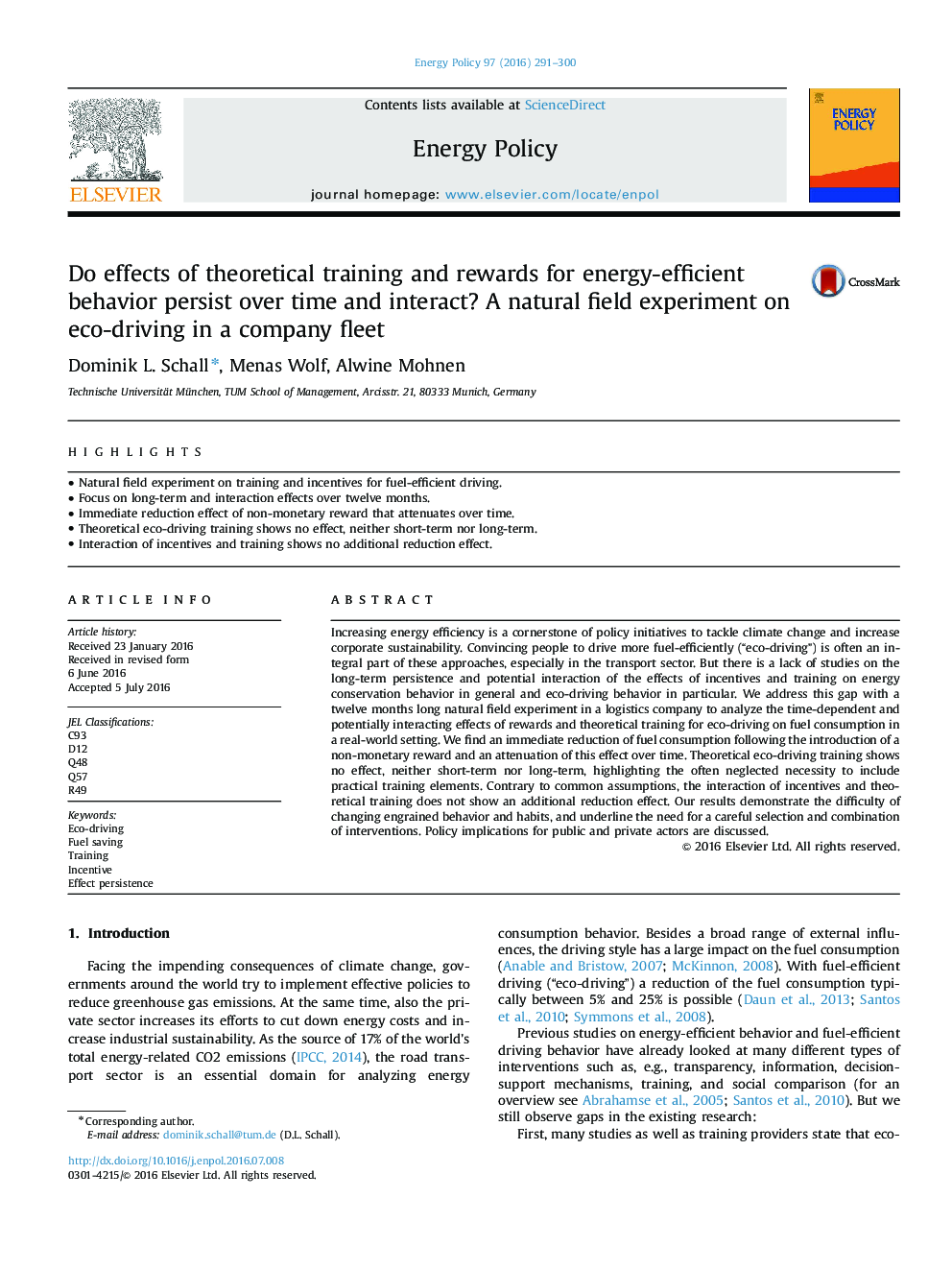| کد مقاله | کد نشریه | سال انتشار | مقاله انگلیسی | نسخه تمام متن |
|---|---|---|---|---|
| 7398442 | 1481261 | 2016 | 10 صفحه PDF | دانلود رایگان |
عنوان انگلیسی مقاله ISI
Do effects of theoretical training and rewards for energy-efficient behavior persist over time and interact? A natural field experiment on eco-driving in a company fleet
ترجمه فارسی عنوان
آیا تأثیر آموزش نظری و پاداش برای رفتار صرفه جویی در انرژی در طول زمان و با هم تعامل دارند؟ یک آزمایش طبیعی روی رانندگی زیست محیطی در ناوگان شرکت
دانلود مقاله + سفارش ترجمه
دانلود مقاله ISI انگلیسی
رایگان برای ایرانیان
کلمات کلیدی
ترجمه چکیده
افزایش بهره وری انرژی، سنگ بنای طرح های سیاست گذاری برای مقابله با تغییرات اقلیمی و افزایش پایداری سازمانی است. اغلب مردم متقاعد شده اند که به طور مؤثرتری از سوخت استفاده کنند (اکو رانندگی)، بخشی جدایی ناپذیر از این رویکردها، به خصوص در بخش حمل و نقل است. اما کمبود مطالعات درمورد پایداری درازمدت و تعامل بالقوه تأثیرات انگیزه ها و آموزش ها در مورد رفتار حفاظت از انرژی به طور کلی و رفتار خاص محیط زیست به طور خاص وجود دارد. ما این شکاف را با یک آزمایش 12 ساعته آزمایش طبیعی در یک شرکت تدارکاتی به تجزیه و تحلیل اثرات وابسته و به طور بالقوه تعامل پاداش و آموزش نظری برای رانندگی زیست محیطی بر مصرف سوخت در یک محیط واقعی واقع می کنیم. ما متوجه کاهش فوری مصرف سوخت پس از معرفی یک پاداش غیر منتظره و ضعف این اثر در طول زمان. تمرین تئوری آموزش رانندگی در محیط زیست نشان می دهد هیچ اثر، نه کوتاه مدت و نه بلند مدت، برجسته ضرورت اغلب نادیده گرفته شده شامل عناصر آموزش عملی است. بر خلاف فرضهای رایج، تعامل انگیزه ها و آموزش نظری، اثر کاهش اضافی را نشان نمی دهد. نتایج ما نشان دهنده دشواری تغییر رفتار و عادت های انگشت است و نیاز به انتخاب دقیق و ترکیبی از مداخلات را برجسته می کند. پیامدهای سیاست برای بازیگران عمومی و خصوصی مورد بحث قرار گرفته است.
موضوعات مرتبط
مهندسی و علوم پایه
مهندسی انرژی
مهندسی انرژی و فناوری های برق
چکیده انگلیسی
Increasing energy efficiency is a cornerstone of policy initiatives to tackle climate change and increase corporate sustainability. Convincing people to drive more fuel-efficiently (“eco-driving”) is often an integral part of these approaches, especially in the transport sector. But there is a lack of studies on the long-term persistence and potential interaction of the effects of incentives and training on energy conservation behavior in general and eco-driving behavior in particular. We address this gap with a twelve months long natural field experiment in a logistics company to analyze the time-dependent and potentially interacting effects of rewards and theoretical training for eco-driving on fuel consumption in a real-world setting. We find an immediate reduction of fuel consumption following the introduction of a non-monetary reward and an attenuation of this effect over time. Theoretical eco-driving training shows no effect, neither short-term nor long-term, highlighting the often neglected necessity to include practical training elements. Contrary to common assumptions, the interaction of incentives and theoretical training does not show an additional reduction effect. Our results demonstrate the difficulty of changing engrained behavior and habits, and underline the need for a careful selection and combination of interventions. Policy implications for public and private actors are discussed.
ناشر
Database: Elsevier - ScienceDirect (ساینس دایرکت)
Journal: Energy Policy - Volume 97, October 2016, Pages 291-300
Journal: Energy Policy - Volume 97, October 2016, Pages 291-300
نویسندگان
Dominik L. Schall, Menas Wolf, Alwine Mohnen,
